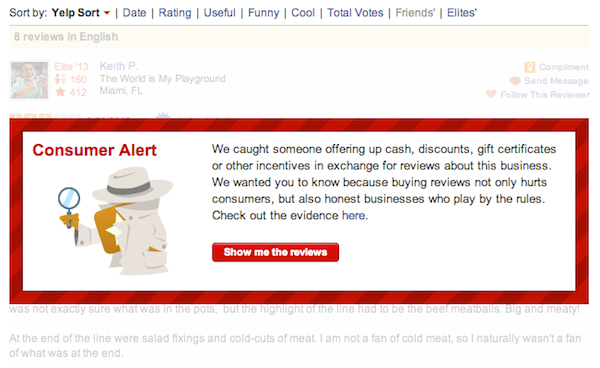
Toward the end of 2012, Bert Levi was faced with a choice. Amidst mounting pressure from outside competition, he was about to do something his conscience told him was a bad idea, but his family business of three generations was faced with dire straits. He solicited some writers on Craigslist with active Yelp accounts to help him out. He had deduced, so he claims, that his biggest competitors had an unfair advantage because they were paying for Yelp reviews.
What he didn’t know was that one of his promising applicants was part of a Yelp sting operation.
When Yelp began in 2004, its idea was to connect friends via email to exchange recommendations on restaurants and services. The idea of spotting and removing fakes was baked in from the start.
In most cases, customers can spot the fakes themselves. The poorly written English is a dead giveaway, or the endless praise for the simplest of tasks is another. Every business wants to be the local shop, the go-to spot, and that has spawned an aggressive review industry.
The site collects more than 40 million reviews, and the founders needed a way to sift through that data and spot fakes quickly. Their original solution was an algorithm designed to catch the bogus reviews, but Yelp has since taken a more proactive stance.
Yelp CEO Jeremy Stoppleman, recently discussed what his company has been doing for the past two years with The Telegraph.
“Maintaining the trust of the consumer is critical to our business,” he said. “We live and breathe only one thing, which is wanting to connect consumers with great local businesses, and I don’t feel we can do that if we don’t have effective ways to prevent gaming of the system.”
As Stoppleman tells it, their model is very much like Google’s in the sense of cat-and-mouse. The team studies fake reviews, seeking commonalities and abnormalities they can filter for. Meanwhile the fakers are studying the trends of what is removed, looking for loopholes in the system that give them an inside edge.
Yelp took their findings to Craigslist, where companies like Levi Family Jewelers are soliciting those services. It began with eight businesses that were caught red-handed, Yelp even posted the correspondence for consumer scrutiny.
Members of Stoppleman’s team will “pose as review writers who are interested in selling reviews to whoever would like to buy them.”
Anyone caught buying reviews is given a notice on their Yelp page that explains that reviews for that business had been incentivized. Yelp’s warning also reiterates their stance on buying reviews: “We wanted you to know because buying reviews not only hurts consumers, but also honest businesses who play by the rules.”
This warning comes in a light-box style modal popup that users must click through before viewing the business. That’s in addition to a warning at the bottom listing reviews that the service does not recommend.
Yelp claims the operation has been very successful. They stated that they have issued 285 consumer alerts so far.
“It’s obviously a deterrent, and as more business owners find out that we’re out there hunting, and you’re likely to get caught red handed if you do, not only is it embarrassing but that’s really going to affect your business for those three months, in that it’s going to drive consumers away from your page,” Stoppelman said.
Yelp’s aggressive level of restriction could help the consumer, or do more harm than good. Who decides whether a five star review is really authentic? What is the criterion Yelp uses to determine these fakers? We most likely won’t get answers anytime soon, but businesses will have to contend with these rules all the same.
